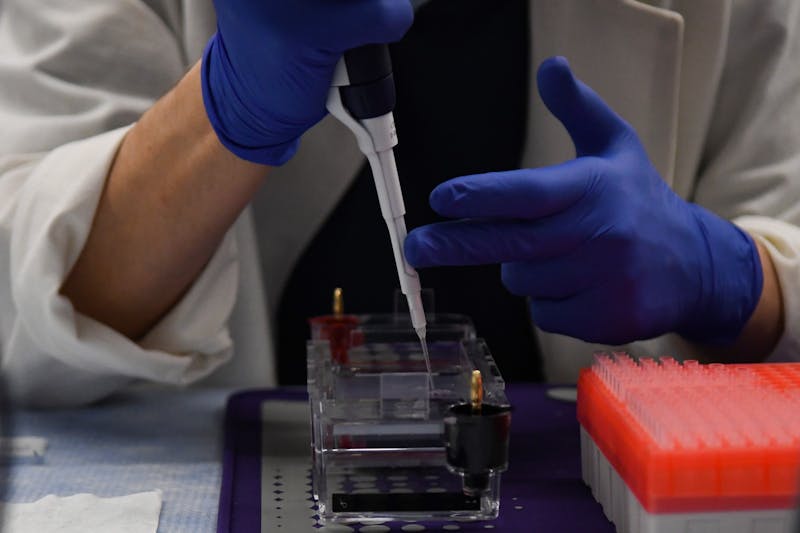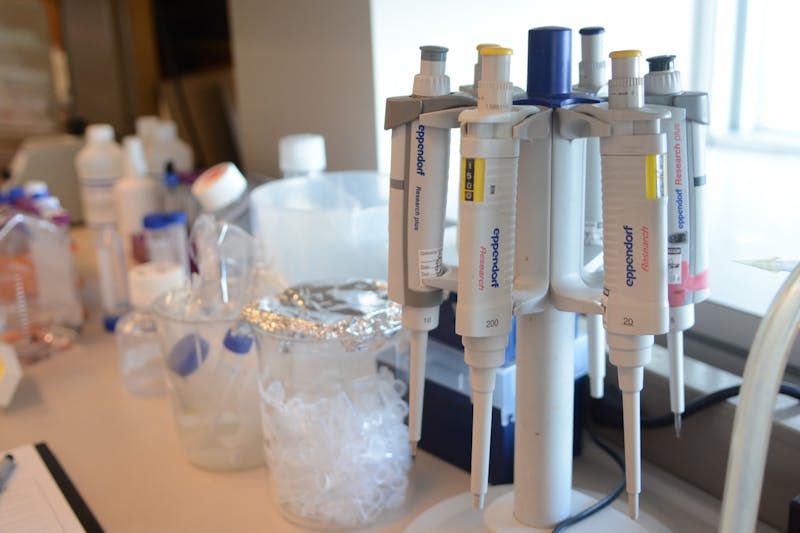
Penn Gene Therapy Program Director James Wilson will leave the University following the transfer of Penn Medicine’s Gene Therapy Program to two new for-profit companies: GEMMA Biotherapeutics and Franklin Biolabs.
Credit: Kylie CooperPenn Gene Therapy Program Director James Wilson will depart the University, and the functions and assets of Penn Medicine’s Gene Therapy Program will be transferred to two new for-profit companies: GEMMA Biotherapeutics and Franklin Biolabs.
The executive committee of Penn’s Board of Trustees voted to approve the spinout in a meeting on July 31. The transition is set to take effect on Oct. 1, and Wilson will then step down from his position as program director and the GTP will be fully discontinued at Penn.
“The GTP’s work has reached a critical inflection point which calls for a new approach to accelerate this progress,” a Penn Medicine spokesperson wrote in a statement to The Daily Pennsylvanian. “With a sharp focus on vector development and manufacturing, the Gene Therapy Program is uniquely positioned to transition into a new model within the biotech industry to scale its activities up and elevate the field to a new level.”
The new companies, which both aim to translate research done at the GTP into new therapeutic treatments, launched last week and will be headquartered in Philadelphia. Wilson will serve as CEO of GEMMABio, a biotechnology company focused on developing accessible, lower-cost gene therapies for rare diseases.
Wilson will also be the board chair of Franklin Biolabs, a genetic medicines contract research organization that offers support for gene therapy services and production.
“Forming these two new entities is the next step to accelerate the future of gene therapy and deliver therapeutics to patients significantly faster,” Wilson said in a press release.
“I don’t think there’s anyone but me to carry this forward,” he added to The Philadelphia Inquirer.
In their statement, Penn Medicine also said that the transactions include plans for the subleasing of facilities and the licensing of GTP’s intellectual property to the two companies. Penn did not disclose the financial terms of the transfer agreement.
More than 220 gene therapy program employees received offers to work for Wilson’s new companies in similar roles, while approximately 25 people will be laid off as a result of the transition.
“We’re excited to see these new companies grow to become strong contributors to the local academic industry ecosystem that has put Philadelphia on the map as a global leader in cell and gene therapy,” Perelman School of Medicine Dean Jonathan Epstein said during the Board of Trustees meeting on July 31.
Wilson founded GTP — the first and largest academic-based gene therapy program — after being recruited to Penn in 1993. The program focuses on developing and commercializing gene therapies to help patients with inherited genetic diseases and has brought in millions of dollars of funding and private industry licensing fees for Penn.
“Dr. Jim Wilson’s vision has spawned tremendous progress in the gene therapy field, propelling discovery and development of gene-delivery viruses that have supported first-in-human studies in 15 different diseases,” the Penn Medicine spokesperson added.
Wilson is recognized for his contributions to research on adeno-associated viruses (AAVs), which are the leading platform for gene delivery in the treatment of human diseases. In the early 2000s, his lab discovered a new family of AAVs from monkey tissues. In 2018, his lab was the first to demonstrate therapeutic in vivo genome editing in primates.
His research and novel technologies have contributed to several in vivo gene therapies, such as Luxturna, the first FDA-approved gene therapy using adeno-associated viruses, that was pioneered by Medical School professor Jean Bennett.
Wilson and GTP have also faced several waves of controversy throughout their 31-year history.
Wilson came under national scrutiny in 1999 after leading a gene therapy trial that resulted in the death of 18-year-old Jesse Gelsinger. Penn was fined $500,000, and Wilson received several research violations from the FDA but was later able to revive the program and Penn’s reputation in the gene therapy field.
In 2021, The Daily Pennsylvanian spoke with 11 GTP employees, who described a “dysfunctional, toxic workplace” and alleged that Penn was failing to hold the program accountable. Penn officials allegedly overhauled a Penn Med investigation into GTP’s workplace abuse allegations to protect its financial interests and Wilson.
In December 2023, GTP laid off approximately 24% of its employees due to financial constraints resulting from decreased investment in biotechnology.
At the beginning of this year, former GTP postdoctoral researcher Susan Faust filed a lawsuit against Wilson, alleging “unethical and illegal conduct” involving a gene therapy technology that she invented while at Penn. Penn filed a motion to dismiss the lawsuit in April.
Wilson also led Penn’s Orphan Disease Center, which will continue operating under new leadership after his departure.
The Daily Pennsylvanian is an independent, student-run newspaper. Please consider making a donation to support the coverage that shapes the University. Your generosity ensures a future of strong journalism at Penn.
Donate












